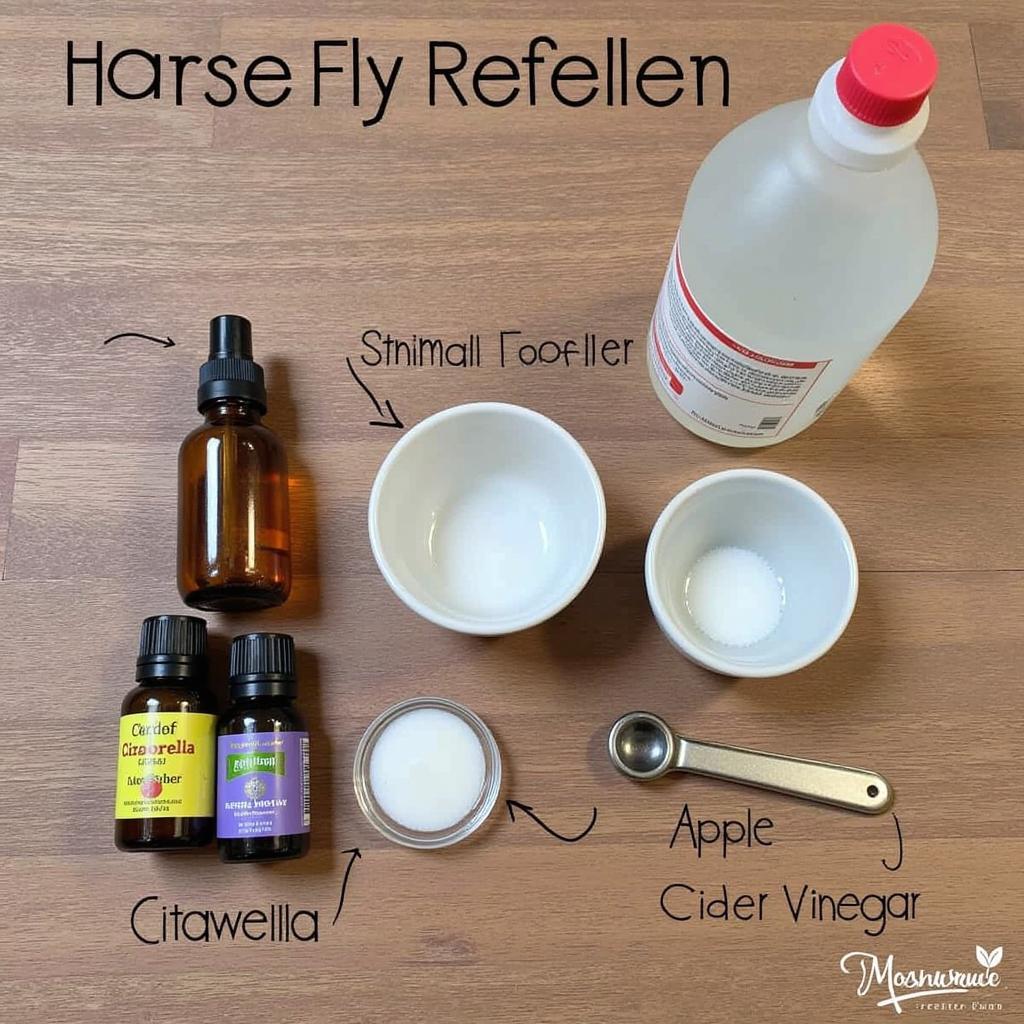Horse Fly Repellent Natural options are increasingly popular among horse owners seeking safe and effective ways to protect their animals from biting flies. These pesky insects can cause significant discomfort, stress, and even transmit diseases. Finding the right balance between repelling flies and ensuring your horse’s well-being is crucial, and natural repellents offer a promising solution.
Understanding the Need for Horse Fly Repellent Natural
Flies are more than just a nuisance; they can impact a horse’s health and performance. Constant buzzing and biting can lead to stress, weight loss, and skin irritations. Moreover, certain fly species can transmit diseases. Choosing a natural horse fly repellent minimizes the risk of exposing your horse to harsh chemicals while effectively deterring these bothersome insects.
Why choose natural? Many commercial fly sprays contain chemicals that can be harmful to horses, especially with prolonged use. citronella horse fly spray is a great natural option. Natural repellents utilize plant-based ingredients like essential oils, offering a safer alternative.
Exploring Natural Horse Fly Repellent Options
A variety of natural ingredients have proven effective in repelling flies. Essential oils like citronella, lavender, and eucalyptus are popular choices, known for their strong scents that deter flies. Other effective natural repellents include apple cider vinegar, garlic, and certain herbs.
Homemade Horse Fly Repellent Recipes
Creating your own horse fly repellent is a cost-effective and customizable solution. Combining essential oils with a carrier oil like witch hazel or apple cider vinegar allows for easy application.  Ingredients for Homemade Horse Fly Repellent Experimenting with different combinations allows you to find the most effective blend for your horse. For example, a simple recipe could involve mixing equal parts apple cider vinegar and water with a few drops of citronella and lavender essential oils.
Ingredients for Homemade Horse Fly Repellent Experimenting with different combinations allows you to find the most effective blend for your horse. For example, a simple recipe could involve mixing equal parts apple cider vinegar and water with a few drops of citronella and lavender essential oils.
Choosing the Right Natural Repellent for Your Horse
Each horse reacts differently to various ingredients. endure sweat resistant fly spray for horses is a reliable option even for horses that sweat a lot. It’s essential to observe your horse’s reaction after applying a new repellent. If any irritation occurs, discontinue use and try a different combination.
Tips for Effective Application of Horse Fly Repellent Natural
Proper application is key to maximizing the effectiveness of any horse fly repellent. Apply the repellent evenly to your horse’s coat, focusing on areas where flies tend to congregate, such as the legs, belly, and face. Reapply as needed, especially after sweating or rain.
What about internal fly repellents?
Some horse owners advocate for internal fly repellents like garlic supplement for horses. While these supplements may not be as immediately effective as topical sprays, they can contribute to an overall fly control strategy. Consult with your veterinarian before incorporating any new supplements into your horse’s diet.
“Internal fly repellents can offer additional protection, but it’s important to remember that they are not a replacement for topical repellents,” advises Dr. Emily Carter, DVM, equine specialist. “They work best as part of a comprehensive fly control program.”
Other Natural Fly Control Methods
Beyond repellents, implementing other fly control measures can significantly reduce fly populations around your barn. Regularly cleaning stalls, removing manure, and providing proper drainage are crucial. Fly traps, fans, and fly predators can also be effective additions to your fly control arsenal.
Conclusion
Horse fly repellent natural options offer a safe and effective way to protect your equine companions from the nuisance and potential health risks associated with biting flies. By exploring various natural ingredients and application methods, you can find the perfect solution for your horse’s needs, ensuring their comfort and well-being throughout the fly season. Remember, using natural horse fly repellent is a responsible choice that benefits both your horse and the environment.
FAQ
- What is the best natural horse fly repellent? The most effective repellent varies depending on the individual horse. Experimenting with different essential oil blends and other natural ingredients is key.
- How often should I apply natural horse fly repellent? Reapply as needed, particularly after sweating or rain.
- Are natural horse fly repellents safe for all horses? Always test a small area first to check for any allergic reactions.
- Can I make my own horse fly repellent? Yes! Many effective recipes are available online and can be customized to your horse’s needs.
- What other fly control methods can I use in conjunction with natural repellents? Regular stall cleaning, manure management, fly traps, and fans can all contribute to a comprehensive fly control strategy.
- Are essential oils safe for horses? Yes, when diluted properly with a carrier oil like witch hazel or apple cider vinegar. essential oils for horses provides more detailed information on this topic.
- Can natural horse fly repellent for humans be used on horses? Some human repellents may be suitable for horses, but always check the ingredients and consult with a veterinarian before applying.
“Consistency is key when it comes to fly control,” says Sarah Mitchell, certified equine herbalist. “Combining natural repellents with other management practices will yield the best results.”
For support, contact us at Phone: 0772127271, Email: [email protected], or visit us at QGM2+WX2, Vị Trung, Vị Thuỷ, Hậu Giang, Việt Nam. We offer 24/7 customer service.